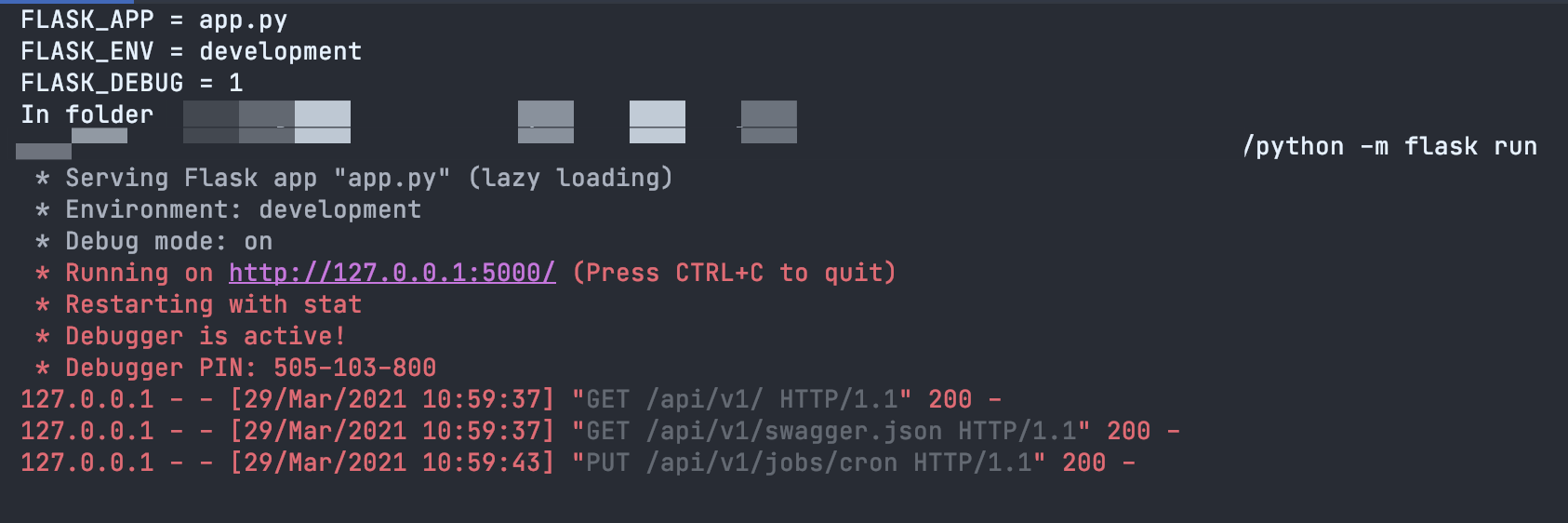-
Notifications
You must be signed in to change notification settings - Fork 184
New issue
Have a question about this project? Sign up for a free GitHub account to open an issue and contact its maintainers and the community.
By clicking “Sign up for GitHub”, you agree to our terms of service and privacy statement. We’ll occasionally send you account related emails.
Already on GitHub? Sign in to your account
Hang caused by basic Flask application layout when using a Jobstore #147
Comments
|
Hello, I suspect this issue has been caused by #140 which was released a couple of days ago, I've reverted the PR just in case. Thanks |
|
@viniciuschiele Hey, thanks for the reply, but I don't think they are related. |
|
@viniciuschiele interestingly version 1.12.1 causes my flask app to hang, whereas reverting to 1.12.0 works |
|
@viniciuschiele Yes I wish you didn't revert that PR, it was a good PR, the reason I opened this issue was to document that the issues is with neither your project nor the APScheduler itself, but how most people develop their Flask apps based on the simple Flask tutorials without using an Application Factory. I myself am simply mocking up a demo so I didn't bother and discovered that if I call start with a JobStore, it would attempt to use the
Thanks! |
|
@RobertDeRose hey, have you successfully gotten an application factory working you can link to? It would be great to add to the docs here! Is there an advantage to the factory vs the basic way when only one wsgi work can run anyways? I fought it for a while and ended up using the basic flask way, but would like to change to the factory at some point. |
|
@RobertDeRose I will do another round of tests with #140 to make sure it doesn't have any impact. Regarding your issue, I haven't been able to reproduce it, I tried running it with My recommendation is always to have the job definitions in a separate file, that prevents this and other issues. |
|
Ok, now I was able to replicate the issue. It isn't a good practice to start the scheduler and have the job definitions in the same file, I think we could change the documentation to explain a better way to organize the structure of the files. Something along those lines: init.py app = App()
scheduler = APScheduler()tasks.py from . import scheduler
@scheduler.task()
def job1():
...main.py from . import app, scheduler, tasks
scheduler.init_app(app)
scheduler.start()
app.run() |
|
@christopherpickering I solved my issue by just ensuring that I did not call @viniciuschiele Yes, I think documenting that pattern and adding a warning in the docs would be sufficient to prevent this issue hopefully for others. |
|
@RobertDeRose yeah, I just rewrote my app as an application factory, and it works when |
|
My Flask apps using an Application Factory, but I use function like I use poetry to manage my package poetry installI use [email protected] which means remove #140 This is my def is_debug_mode():
val = os.environ.get("FLASK_DEBUG")
if not val:
return os.environ.get("FLASK_ENV") == "development"
return val.lower() not in ("0", "false", "no")
def is_werkzeug_reloader_process():
return os.environ.get("WERKZEUG_RUN_MAIN") == "true"
def create_app():
app = Flask(__name__)
app.config.from_object(DevelopmentConfig)
apis.init_app(app)
# models.init_app(app)
# ⬇chose one mode
# if you use #140
if is_werkzeug_reloader_process():
pass
else:
tasks.init_app(app)
# This is my solution
# if is_debug_mode() and not is_werkzeug_reloader_process():
# pass
# else:
# tasks.init_app(app)
return app
from app.extensions import scheduler
def init_app(app):
scheduler.init_app(app)
scheduler.start()Make sure debug mode is on. Then let APScheduler do not start in Then choose my solution if is_debug_mode() and not is_werkzeug_reloader_process():
pass
else:
tasks.init_app(app)This PR has same way #151 |
|
nice! I copied the way to detect debug, and put a pull request w/ it in new docs : ) Its a first try, probably needs tweaked more. #154 I use poetry as well, but left it out of these docs.. its a doc in itself 😁 |
|
@Gkirito Thanks for providing a full example, that helps a lot. I will push a PR to fix that. |





If you follow a basic Flask tutorial and don't use a Application Factory pattern and use the basic global
appdevelopment, following the docs on the README and root of the documentation can lead to a Hang that is hard to figure out.Example
__init__.pyThe docs should highlight this issue as it has been seen by a decent number of people as seen here agronholm/apscheduler#250
Solution
Simply move
scheduler.start()to the bottom of__init__.pyor follow the Application Factory patternThe text was updated successfully, but these errors were encountered: